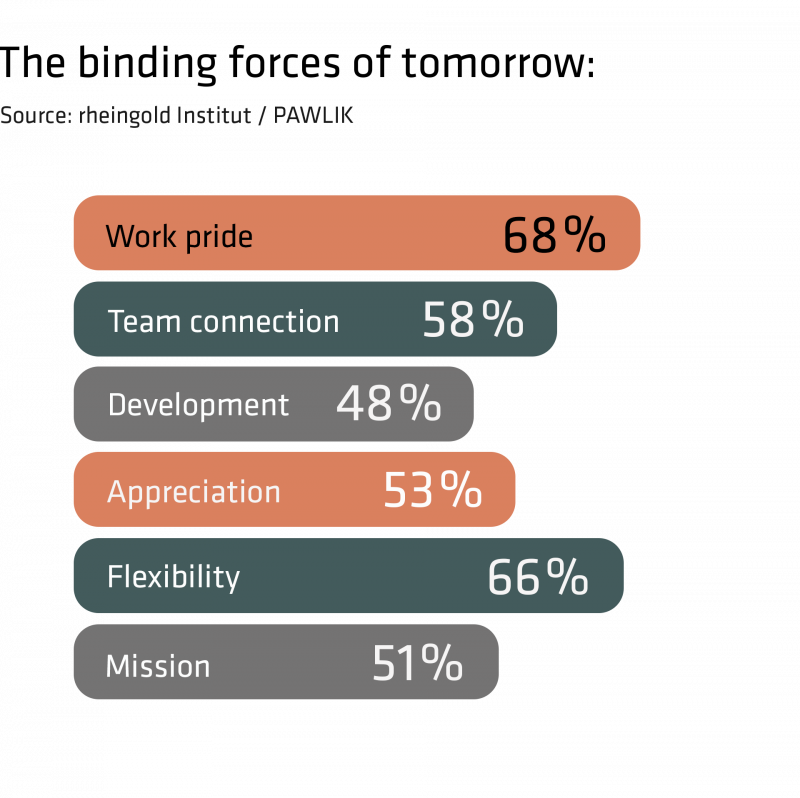At the topic day “From employer to host?” on 1 March 2023 at the IBA Forum online stage, psychologist and founder of the rheingold Institute Stephan Grünewald opened the session. Headlined “Cohesion – The bonding forces of tomorrow”, he gave exciting insights into the in-depth psychological study on employee retention conducted together with the PAWLIK management consultancy agency. Especially in the context of the increasing shortage of skilled workers, rising employee turnover and the desire for more flexibility, approaches to creating cohesion, a sense of “we” and a desire to be present are particularly important.
The first finding of the study already reveals an alarming insight into the current state of employee retention: Approximately 83 % of employees in Germany describe themselves as disengaged, and an additional 73 % are considering reorienting themselves in the next year. However, in two-hour in-depth psychological interviews with employees from companies of various sizes and industries, the study was able to identify six factors that strengthen employee loyalty: Work pride, mission, team connection, appreciation, flexibility and further education.
Shared goals and pride strengthen bonds
The first and strongest factor highlighted by the study is the so-called work pride. “Employees want responsible scope to identify with their performance,” Grünewald explains. The results show that while many employees feel they work a lot, they do not develop pride in their work or the company. This is also due to the fact that work processes have become very small-scale and complex – one’s own contribution is often difficult to recognise. Work pride is then often replaced by a kind of pride in exhaustion. “Exhaustion becomes the indicator of productivity and sometimes leads to exhaustion competition in companies,” Grünewald explains. It has a particularly negative effect on retention when tasks are perceived as unsolvable or are made more difficult by poor equipment.

The mission factor is closely linked to work pride. When employees feel they are part of a common, overarching goal, it increases engagement and pride in the company. Employees seek meaning and social relevance in their work – so they can better identify with it and the company. The more employees work solely from home or remotely, the more important it becomes to have a credible, meaningful mission that enables them to identify with the company regardless of where they physically work. The same applies to the next factor presented, the team connection. Working from home, social components of work cannot be sufficiently experienced. Virtual meetings can transfer the work-related part in particular to the digital world, but the team feeling suffers from the spatial distance. Grünewald notes that in many companies there are (still) no rules on who comes to the office and when. The result: although many employees now like to return to the office a few days a week, it remains a coincidence if one actually meets the hoped-for colleagues in the office. This requires managers to develop a sense of where there are difficulties in getting back together.
More individuality in work and further education
Flexibility in the daily work routine is an important topic, especially for young employees. Grünewald explains that the new generation of employees no longer relies on predefined career paths, but seeks guidelines and also a lot of freedom in organising their working hours. The last factor, further education, is also about the individual promotion of employees. They want to be seen and supported with their personal strengths and weaknesses. Further education measures should therefore not only benefit the company, but above all support the employee in his or her individual development.
Overall, it is up to the companies to offer their employees the necessary basics to develop a close bond with the company. Particularly by responding more individually to the employees’ needs, they can be given a sense of belonging and cohesion can be strengthened.




